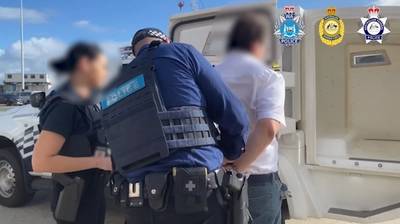Two Seafarers Charged Following Bulk Carrier Drug Bust
Two seafarers have been brought up on charges for their alleged roles in smuggling cocaine into Western Australia on board a Marshall Islands-flagged bulk carrier.
The men, both from Montenegro, were serving as master, 43, and chief engineer, 39, on board the 58,000-dwt supramax St Pinot. They have been charged with importing a commercial quantity of cocaine by the Australian Federal Police (AFP) and are expected to face Perth Magistrates Court on Friday.
Police allege the pair knew cocaine was hidden on board the ship and planned to drop it overboard off the Fremantle coast to be collected by another group. The master allegedly instructed other crew members to alter the vessel's course as it neared Fremantle Port to rendezvous with another vessel, a cabin cruiser, named No Fixed Address, but police say the planned exchange failed.
The men allegedly then attempted to conceal the drugs by filling the ballast tank that the drugs were hidden in with water and instructed members of the crew to backdate logs and provide false information to shipping agent authorities.
The two Montenegrin nationals have each been charged with one count of importing a commercial quantity of a border controlled drug, namely cocaine, into Australia, contrary to section 307.1(1) of the Criminal Code 1995 (Cth). They face a maximum penalty of life imprisonment if convicted.
“These individuals allegedly went to great lengths to hide their illegal activities from law enforcement and other authorities but the AFP and its partners are committed to stopping the supply of harmful drugs from reaching the Australian community," said AFP Assistant Commissioner Pryce Scanlan. “Our message to organized crime groups is that the AFP will be unyielding in protecting Australians from the harm caused by these illicit drugs and the associated criminal behavior."
Some 849.5 kilograms of cocaine was found last month after a joint agency investigation. Police arrested three men, aged 21, 25 and 29, who had been travelling on the cabin cruiser and charged them for their alleged involvement in the attempted import.
A replacement master and chief engineer have been brought onto the ship while authorities continue their comprehensive search of the bulk carrier.
ABF Commander Operations West, Ranjeev Maharaj, said cocaine shipments were being seized at Australia's border at record levels, and the ABF worked in close collaboration with partner agencies both domestic and abroad to combat this criminal behavior.
“The Australian border is a strategic national asset and is fundamental to our national security, economy prosperity and way of life," Commander Maharaj said. “That is why the ABF works so closely with our law enforcement partners to ensure that the border remains a hostile environment for criminals attempting to import illicit drugs. We will continue to deter, detect and disrupt those who seek to import harmful drugs into Australia."
Australian Criminal Intelligence Commission (ACIC) Executive Director Intelligence Operations Jennifer Hurst believed multi-agency collaboration was crucial to combatting the harm of illicit drugs in Australia.
“ACIC intelligence shows cocaine poses a high risk to the Australian community, which is causing ongoing harm and diverting astronomical amounts of money into the criminal economy," Hurst said. “Collaborative efforts such as this are essential to disrupting transnational crime syndicates and dismantling the illicit drug market."













